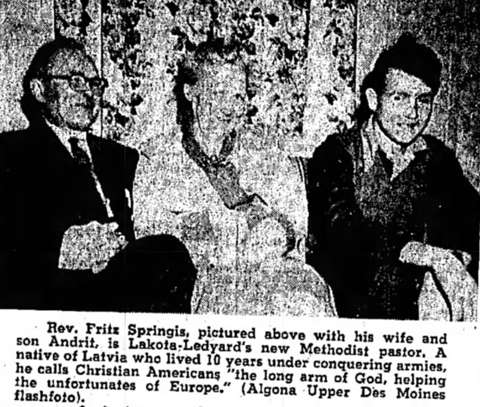The Algona Upper DesMoines, Tuesday, Feb. 26, 1952

Photo Caption: Rev. Fritz Springis, pictured above with his wife and son Andrit, is Lakota-Ledyard’s new Methodist pastor. A native of Latvia, who lived 10 years under conquering armies, he calls Christian Americans “the long arm of God, helping the unfortunates of Europe.” (Algona Upper Des Moines flashfoto.)
* * *
By Paul Schenck
When Lakota-Ledyard’s new Methodist pastor stops laughing, it’s to say that he is “laughing from joy at being in God’s great country – America.”
After years of fleeing from conquering armies, “it seems more like a fairy tale” that this Latvian native and his family should be safe in the United States, and he is starting work in his new pastorate.
And so he laughs – laughs because he is overjoyed; laughs because he is naturally good-natured and jovial; and laughs because that is the best way to remember part of the past.
Rev. Fritz Springis, new Methodist minister in the Lakota and Ledyard churches, lived three years funder Russian Communism, three years under German Fascism, and four years in the British-controlled West German sector. With those 10 years of memories, he takes real pride in swearing allegiance to the United States flag.
Refused Fascist Pledge
Rev. Springis and his family were happy in the Latvian home in Riga, the capital city, where he was an officer in the Ministry of Education until 1935. In that year he was ousted from his post because he refused to sign a loyalty pledge to the Fascist government, which swept over Latvia as it did all of Europe.
Trained in philosophy, he then became a minister of a Methodist church in Latvia.
Russian armies conquered the little Baltic country in 1941, and the Springis family fled. Since then, they have never seen their home, but know that Riga was almost completely destroyed in the war and that there is no reason to return.
Rev. Springis escaped to the forests, where he hid out, moving constantly from place to place. Under the Russian conquerors, the best and highest educated people can usually be found in the forests, he recounts.
Escaped Deportation.
The German armies marched through the Baltic countries, and Rev. Springis was again safe, not as a Methodist minister, but as a refugee from Communism.
But Hitler’s conquerors were driven back from Moscow, and Russians again invaded Latvia. Fleeing to East Germany, Rev. Springis and his family were safe only until the Russians swept over that country, too.
The refugee minister now jokes about his experiences as a Russian slave laborer. He was given an old horse and told to cut timber, to be shipped back to Russia. The ancient nag died, and the Reverend was charged with sabotaging the work detail, with penalty of deportation.
He escaped from Communistic police and fled to West Germany, in 1947, followed shortly by his family. Working there side by side with teachers and court judges as brick masons, they eked out a living.
Speaks 7 Languages.
Finally, on October 26, 1951, the family sailed from Rotterdam, the passage paid for by a Methodist church in Connecticut. Bishop Charles Brashares of DesMoines placed him at Humboldt, where he shadowed Rev. C. R. Buckwalter to learn the ways of Iowa Methodism.
Rev. Springis delivered his trial sermon at the Lakota-Ledyard churches, Jan. 28, and assumed the pastorate as of Feb. 1.
The minister and his family speak Latvian and German fluently, using either in their home conversations, as well as Russian, Swedish, Norwegian, Danish, English and now the American version of English. His three months in the country constitute his only practice in speaking English, although he studied it as a boy in Latvia.
His sermons and services are interesting, to say the least, but few realize the work that goes into them. He first writes the sermon, then laboriously rewrites and corrects the copy, using the English translation of the Bible as his grammar book.
“Americans go forward in everything but their language,” he declares. “Those silent letters that aren’t pronounced are the worst.” But the family is too happy here to have complaints, and is rapidly adopting American customs and habits.
Prefers Hitler to Stalin.
The one son, 16-year-old Andrit (pronounced Andray), is attending the Lakota school. In the eighth grade at Humboldt, he will probably be placed in high school in Lakota. At present, language is his greatest problem, too. Two older Springis children are still in Germany.
Looking back, Rev. Springis can say from experience, that he hates all forms of dictatorship, but of the two he has lived under, he would prefer Fascism to Communism: “Hitler’s gas chambers are better than Stalin’s slow death in slave labor.”
By Communistic standards, Rev. Springis is probably already a Capitalist. He now motors between Lakota and Ledyard in a newly acquired 1930 Model A auto – one more reason for him to laugh for joy in his adopted country.
* * * * * * * * * * * *
Wright County Monitor, Thursday, March 19, 1953
Lakota Minister To Speak Sunday
Rev. Fritz Springis, pastor of the Methodist church in Lakota will speak at the Methodist church in Goldfield, next Sunday evening at 7:30 p.m. Pastor Springis will describe vividly from alarming personal experiences what it means to fall victim to the Russian Communist anti-religion persecution.
The speaker was a Methodist pastor in the former Baltic and Slavic annual conference of the Methodist church, which was dissolved in 1939 by the action of the totalitarian government of the U.S.S.R.
Pastor Springis served with devotion and sacrifice, beyond that required of most men, until imprisoned by the Russian conquerors of his native Latvia. He was condemned to be murdered and will relate how he was saved at the very last minute, but only to suffer imprisonment and discomfort until brought to the United States by the Methodist committee for the care of displaced persons. Befriended by the Rev. C. R. Buckwalter of Humboldt, who gave much personal time to teach him the English language, Pastor Springis is now in charge of the Methodist congregations of Lakota and Ledyard.
* * * * * * * * * * * *
Council Bluffs Nonpareil, Wednesday, Oct. 27, 1954
Latvian Boy, 12, Bound For Iowa.
NEW YORK (AP)—A 12-year-old Latvian boy bound for Iowa was one of 70 refugees who arrived at Idlewild Airport Tuesday night from Athens, Greece, and Munich, Germany.
The lad, Gunnar Springis, was met by his grandfather, the Rev. Fritz Springis of Lakota, Iowa. The Rev. Mr. Springis is pastor of the Lakota Methodist church.
Gunnar’s parents were killed after they fled Latvia during World War II. The Rev. and Mrs. Springis had to leave the boy behind when they emigrated to the United States three years ago.
Gunnar lived with the family of a minister in Hamburg, Germany, while his grandparents arranged for his admission to this country.
The 70 refugees, all sponsored by the World Council of Churches’ Church World Service, were the first large group to arrive under the Refugee Relief Act of 1953.
* * * * * * * * * * * *
The Algona Upper Des Moines
Thursday, June 30, 1955
Rev. and Mrs. Springis attended the District conference in Fort Dodge last week and at that time was assigned to a church in Elma. Within the last year, Rev. and Mrs. Springis have been overjoyed to receive two of their grandsons into their home. Gunner, who was 12 when he arrived and Thursten about 5. The parents of both boys were casualties of the wars in Latvia. Rev. and Mrs. Springis will be greatly missed in this community for they have taken an active interest in both church and community work. Rev. Springis has been in demand as special speaker telling of their experiences.
Andrit Springis left Mason City last Thursday for Camp Chaffee, Ark. He expects to be in the Third Armored Division. Andrit is the son of Rev. and Mrs. Fritz Springis. At the time of his arrival in Lakota, Andrit entered the local high school as a freshman and graduated with honors in May of this year, having completed his work with his class besides mastering the English language. The Springis family arrived from Latvia as refugees only a short time before coming to Lakota.
* * * * * * * * * * * *
Research Completed & Transcribed, 14 Mar 2020
